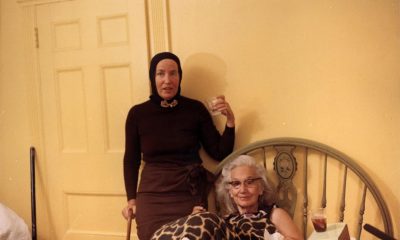News
Gay Vatican suicide now documentary film
American filmmaker wants story of Italian writer’s death to be message for new Pope
Gay activists in Italy say Italian gay writer Alfredo Ormando is credited with triggering Italy’s version of the Stonewall rebellion in 1998 when he took his own life by setting himself on fire in St. Peter’s Square at the Vatican to protest the Catholic Church’s condemnation of homosexuality.
A documentary film called Alfredo’s Fire, which tells the story of Ormando’s struggle to cope with anti-gay bias and religious intolerance, and the subsequent gay Vatican suicide, is intended to send a message to the Vatican and the new Pope, according Andy Abrahams Wilson, the gay American filmmaker who is nearing completion of the documentary.
“In Alfredo’s name and in the names of countless other LGBT people – from those burnt at the stake in the Middle Ages, to Alfredo’s fire, to the lives and spirits that are routinely extinguished because of the Catholic Church’s anti-gay teachings – may Pope Benedict XVI’s abdication signal new light and hope for all of us,” Wilson said in a statement.
He told the Blade he’s been working on the film for fifteen years, while working on other projects, and considers it a labor of love. Among other things, he hopes the 40-minute documentary will enable the tragedy of Alfredo Ormando’s death to shed light on how religious teachings can result in dire consequences for LGBT people.
The film is expected to be released in late spring or early summer, Wilson said. He plans to submit it to various international film festivals and will enter it as a potential nominee for a short film-documentary for an Academy Award.
As a conclave of cardinals from throughout the world gathers at the Vatican to select Benedict XVI’s successor, Abrahams Wilson and his non-profit film company, Open Eye Pictures of Sausalito, Calif., are making an appeal for contributions to help cover post-production costs for the film.
He said the film will be made available to faith-based organizations and LGBT groups for viewing as an educational tool to address anti-LGBT prejudice and discrimination.
“On January 13, 1998 Alfredo Ormando, a 39-year-old Italian writer, arrived in Rome just as the sun was rising,” a promotional write-up released by Open Eye Pictures says. “After a long journey from his native Sicily, he found his way to the empty plaza of St. Peter’s Square and, facing the entrance to the Basilica, knelt down as if to pray,” the write up says.
“He made a rapid hand gesture and suddenly was engulfed in flames. Before the Church and God, Alfredo Ormando had lit himself on fire,” the write-up says.
In letter he sent to a friend about a month before his death, Ormando said, “I hope they’ll understand the message I want to leave: it is a form of protest against the Church that demonizes homosexuality, and at the same time all of nature, because homosexuality is her offspring.”
Wilson said he began filming the documentary in 1998 shortly after Ormando’s death. He said he returned to Italy in 2000 to continue his work on the project during a week when Italian and European LGBT activists held an international LGBT Pride festival and parade in Rome. The LGBT events took place during the Catholic Church’s Year of the Jubilee in Rome celebrating 2000 years of Christianity, which attracted thousands of Catholics throughout the world.
In a protest at the Vatican at that time, Wilson and several American gay activists, including Rev. Mel White of the U.S. group Soul Force and members of the U.S. gay Catholic group Dignity, joined Italian gay activists in demanding that the Catholic Church modify its stance on LGBT people.
While carrying poster size photos of Ormando, the protesters planned to deliver a letter to then Cardinal Joseph Ratzinger, who later became Pope Benedict XVI, according to Wilson. At the time, Ratzinger was in charge of the Church’s Congregation for the Doctrine of the Faith, which several years earlier issued a statement written by Ratzinger calling gay people “intrinsically disordered.”
Although the protesters were unable to deliver the letter to Ratzinger, Wilson said the gathering inspired him to examine the life of Alfredo Ormando through interviews with those who knew him and through his numerous writings.
Wilson said he hopes to premiere the film in Palermo, Sicily, in June, in the Italian region where Ormando was born and raised, during Italy’s 2013 National LGBT Pride celebration, which takes place in that city.
Puerto Rico
Bad Bunny shares Super Bowl stage with Ricky Martin, Lady Gaga
Puerto Rican activist celebrates half time show

Bad Bunny on Sunday shared the stage with Ricky Martin and Lady Gaga at the Super Bowl halftime show in Santa Clara, Calif.
Martin came out as gay in 2010. Gaga, who headlined the 2017 Super Bowl halftime show, is bisexual. Bad Bunny has championed LGBTQ rights in his native Puerto Rico and elsewhere.
“Not only was a sophisticated political statement, but it was a celebration of who we are as Puerto Ricans,” Pedro Julio Serrano, president of the LGBTQ+ Federation of Puerto Rico, told the Washington Blade on Monday. “That includes us as LGBTQ+ people by including a ground-breaking superstar and legend, Ricky Martin singing an anti-colonial anthem and showcasing Young Miko, an up-and-coming star at La Casita. And, of course, having queer icon Lady Gaga sing salsa was the cherry on the top.”
La Casita is a house that Bad Bunny included in his residency in San Juan, the Puerto Rican capital, last year. He recreated it during the halftime show.
“His performance brought us together as Puerto Ricans, as Latin Americans, as Americans (from the Americas) and as human beings,” said Serrano. “He embraced his own words by showcasing, through his performance, that the ‘only thing more powerful than hate is love.’”

The Comings & Goings column is about sharing the professional successes of our community. We want to recognize those landing new jobs, new clients for their business, joining boards of organizations and other achievements. Please share your successes with us at [email protected].
The Comings & Goings column also invites LGBTQ+ college students to share their successes with us. If you have been elected to a student government position, gotten an exciting internship, or are graduating and beginning your career with a great job, let us know so we can share your success.
Congratulations to David Reid on his new position as Principal, Public Policy, with Brownstein Hyatt Farber Schreck. Upon being named to the position, he said, “I am proud to be part of this inaugural group of principals as the firm launches it new ‘principal, public policy’ title.”
Reid is a political strategist and operative. He is a prolific fundraiser, and skilled advocate for legislative and appropriations goals. He is deeply embedded in Democratic politics, drawing on his personal network on the Hill, in governors’ administrations, and throughout the business community, to build coalitions that drive policy successes for clients. His work includes leading complex public policy efforts related to infrastructure, hospitality, gaming, health care, technology, telecommunications, and arts and entertainment.
Reid has extensive political finance experience. He leads Brownstein’s bipartisan political operation each cycle with Republican and Democratic congressional and national campaign committees and candidates. Reid is an active member of Brownstein’s pro-bono committee and co-leads the firm’s LGBT+ Employee Resource Group.
He serves as a Deputy National Finance Chair of the Democratic National Committee and is a member of the Finance Committee of the Democratic Governors Association, where he previously served as the Deputy Finance Director.
Prior to joining Brownstein, Reid served as the Washington D.C. and PAC finance director at Hillary for America. He worked as the mid-Atlantic finance director, for the Democratic Senatorial Campaign Committee and ran the political finance operation of a Fortune 50 global health care company.
Among his many outside involvements, Reid serves on the executive committee of the One Victory, and LGBTQ Victory Institute board, the governing bodies of the LGBTQ Victory Fund and Institute; and is a member of the board for Q Street.
Congratulations also to Yesenia Alvarado Henninger of Helion Energy, president; Abigail Harris of Honeywell; Alex Catanese of American Bankers Association; Stu Malec, secretary; Brendan Neal, treasurer; Brownstein’s David Reid; Amazon’s Suzanne Beall; Lowe’s’ Rob Curis; andCornerstone’s Christian Walker. Their positions have now been confirmed by the Q Street Board of Directors.
District of Columbia
D.C. pays $500,000 to settle lawsuit brought by gay Corrections Dept. employee
Alleged years of verbal harassment, slurs, intimidation

The D.C. government on Feb. 5 agreed to pay $500,000 to a gay D.C. Department of Corrections officer as a settlement to a lawsuit the officer filed in 2021 alleging he was subjected to years of discrimination at his job because of his sexual orientation, according to a statement released by the American Civil Liberties Union of D.C.
The statement says the lawsuit, filed on behalf of Sgt. Deon Jones by the ACLU of D.C. and the law firm WilmerHale, alleged that the Department of Corrections, including supervisors and co-workers, “subjected Sgt. Jones to discrimination, retaliation, and a hostile work environment because of his identity as a gay man, in violation of the D.C. Human Rights Act.”
Daniel Gleick, a spokesperson for D.C. Mayor Muriel Bowser, said the mayor’s office would have no comment on the lawsuit settlement. The Washington Blade couldn’t immediately reach a spokesperson for the Office of the D.C. Attorney General, which represents the city against lawsuits.
Bowser and her high-level D.C. government appointees, including Japer Bowles, director of the Mayor’s Office of LGBTQ Affairs, have spoken out against LGBTQ-related discrimination.
“Jones, now a 28-year veteran of the Department and nearing retirement, faced years of verbal abuse and harassment from coworkers and incarcerated people alike, including anti-gay slurs, threats, and degrading treatment,” the ACLU’s statement says.
“The prolonged mistreatment took a severe toll on Jones’s mental health, and he experienced depression, Post-Traumatic Stress Disorder, and 15 anxiety attacks in 2021 alone,” it says.
“For years, I showed up to do my job with professionalism and pride, only to be targeted because of who I am,” Jones says in the ACLU statement. “This settlement affirms that my pain mattered – and that creating hostile workplaces has real consequences,” he said.
He added, “For anyone who is LGBTQ or living with a disability and facing workplace discrimination or retaliation, know this: you are not powerless. You have rights. And when you stand up, you can achieve justice.”
The settlement agreement, a link to which the ACLU provided in its statement announcing the settlement, states that plaintiff Jones agrees, among other things, that “neither the Parties’ agreement, nor the District’s offer to settle the case, shall in any way be construed as an admission by the District that it or any of its current or former employees, acted wrongfully with respect to Plaintiff or any other person, or that Plaintiff has any rights.”
Scott Michelman, the D.C. ACLU’s legal director said that type of disclaimer is typical for parties that agree to settle a lawsuit like this.
“But actions speak louder than words,” he told the Blade. “The fact that they are paying our client a half million dollars for the pervasive and really brutal harassment that he suffered on the basis of his identity for years is much more telling than their disclaimer itself,” he said.
The settlement agreement also says Jones would be required, as a condition for accepting the agreement, to resign permanently from his job at the Department of Corrections. ACLU spokesperson Andy Hoover said Jones has been on administrative leave since March 2022. Jones couldn’t immediately be reached for comment.
“This is really something that makes sense on both sides,” Michelman said of the resignation requirements. “The environment had become so toxic the way he had been treated on multiple levels made it difficult to see how he could return to work there.”
-

 a&e features4 days ago
a&e features4 days agoMarc Shaiman reflects on musical success stories
-

 Television4 days ago
Television4 days agoNetflix’s ‘The Boyfriend’ is more than a dating show
-

 Opinions4 days ago
Opinions4 days agoSnow, ice, and politics: what is (and isn’t) happening
-

 Movies4 days ago
Movies4 days ago50 years later, it’s still worth a return trip to ‘Grey Gardens’





















